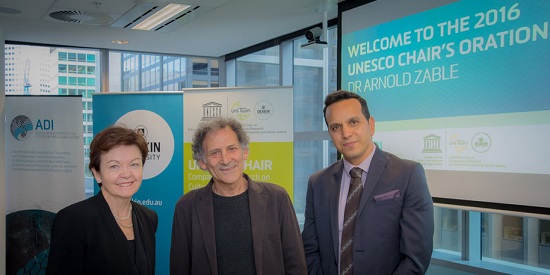UNESCO Chair orator calls on Australians to reach out to refugees
Media releaseHuman rights advocate Dr Arnold Zable last night urged Australians to reach out to refugees and people who had fallen through the cracks, hear their powerful stories and help bridge the divisions in today’s society.
The acclaimed author, writer and storyteller’s strong message came as he delivered the fourth annual Oration for the UNESCO Chair for Cultural Diversity and Social Justice at Deakin’s Melbourne Corporate Centre.
Dr Zable’s address “Here is Where We Meet: The Humanising Power of Story”, encouraged people to meet `the other’, listen and learn about their lives and help cut cultural, racial, gender and class divides to build a stronger and more inclusive society.
Holder of the UNESCO Chair for Cultural Diversity and Social Justice, Deakin’s Professor Fethi Mansouri, has also called on Australian politicians to show strong leadership and engagement to help nurture a sense of belonging for vulnerable and marginalised people.
Professor Mansouri, the Alfred Deakin Institute for Citizenship and Globalisation Director, said the international community’s greatest challenge today was the fear of those who, through no fault of their own, were construed as being outside society.
“They can be a refugee, an indigenous person, newly arrived migrants, Muslims, homeless and unemployed people,” Professor Mansouri said. “Yet each is a person, each has a story, if we take the time to listen and hear it.”
The Alfred Deakin Institute hosts the UNESCO Chair Oration. Preeminent thinkers in social justice, cultural diversity and human rights are selected to deliver the annual lecture.
Professor Mansouri said while Dr Zable’s address reflected on the power of the story, it was not the deliberately construed, negative and demonising story played out through news and social outlets and populated by politicians on a daily basis.
"Dr Zable’s Oration is of critical importance because it is about giving a voice to ‘unheard’, the ‘excluded’ , the ‘silenced’ far away in off-shore detention centres. For we know that inclusion begins with understanding. And that understanding is built upon the foundation of the shared experience we gain from story-telling. This is the humanising power of story."
Share this story

